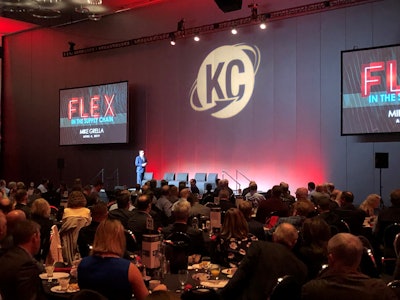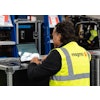
KC SmartPort’s 2019 Annual Industry Briefing: FLEX delivered an expert panel of leaders from Amazon, Cushman & Wakefield, BNSF Railway and Heitman Architects.The panel addressed a crowd of more than 550 logistics, real estate and economic development professionals on April 4 in Kansas City.
According to CBRE, the Kansas City industrial market grew by close to 40 million square feet from 2012-19. This growth—and continued spec development—is happening across all sub-markets in the KC region.
“The Kansas City region has been on fire the last six to seven years in the industrial market. While the economy and most indicators point to continued growth, the need for companies to increase flexibility in operations and hiring practices has never been greater," says Chris Gutierrez, president of KC SmartPort. "That is true of how companies build, use and occupy space as well.
Event speakers discussed the ways companies and organizations are adapting to changes and opportunities by implementing flexible practices and flexible supply chains.
Mike Grella, Amazon’s director of economic development from 2012-19, was the keynote speaker for the event. Grella oversaw Amazon’s expansion projects totaling more than 50 million square feet, encompassing $10 billion in investment, generating 100,000-plus jobs. His speech described trends in flexible space usage and its corresponding requirements.
“Today, metros excelling in the supply chain and logistics space boast a reasonable cost structure, deep expertise leaning on disruptive technologies and top-notch educational institutions that can fill the talent pipeline,” says Grella. “The KC metro area checks a number of those boxes, evidenced by the 3.3 million square feet of new spec warehouse space so far in 2019. Developers will continue to funnel resources into these dominant supply chain hubs.”
Other panelists included Karl Heitman, president, Heitman Architects, who has 30 years of experience in corporate facility design, plus a unique understanding of “Manufacturing 4.0” technologies and digital connectivity; Colby Tanner, assistant vice president, BNSF Railway, who is responsible for directing, planning and implementing the location and expansion of industries within the BNSF System; and Ann Petersen, managing director, Cushman & Wakefield, with 15 years of experience in economic development negotiations, including coordination and implementation of incentives.
These experts discussed a number of topics, including workforce development, last mile, predictive delivery, food logistics, cold storage and space usage/design.
"Impacts of ‘Manufacturing 4.0’ and universal connectivity will dramatically reshape our global supply chains in the next 10 to 20 years,” says Heitman. “Product manufacturers and consumers will be connected directly, and the distribution model that we know today will be completely transformed."
Heitman predicts economics will drive rapid change, suggesting the cost to manufacture products will drop 20 percent to 50 percent, allowing lower prices for consumers and higher margins for producers.
Similarly, Tanner adds: “More freight moved on rail in 2018 than it has over a 200-year history. It is the greenest way to move freight. In addition, intermodal traffic is expected to grow by 40 percent in the next 25 years.”
Automation, the Internet of Things (IoT) and artificial intelligence are also impacting the efficiency and growth of supply chain operations around the world, a topic carefully reviewed during the event.

















